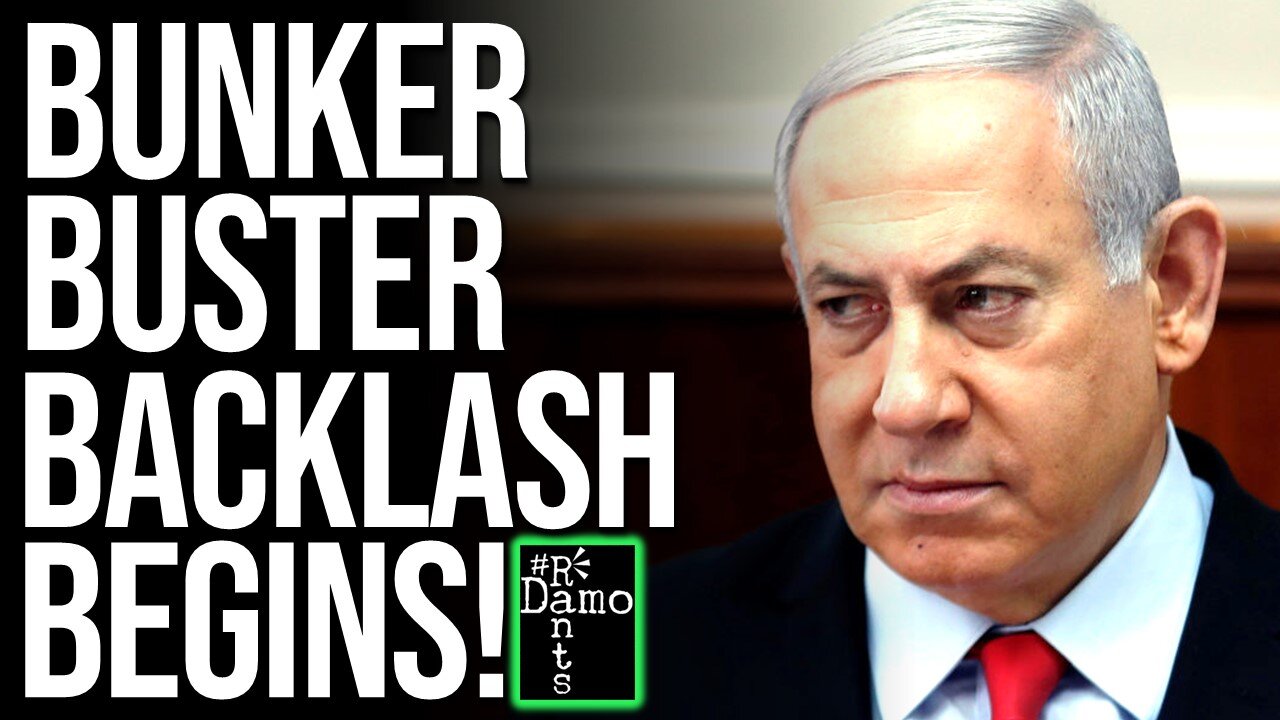Premium Only Content

He Bombed Iran… It Backfired… Now He’s At It Again
Right, so war is referred to as a theatre, the theatre of war and if this is true, then Benjamin Netanyahu is preparing for his next act on the big stage also known as Washington, D.C.—with Donald Trump apparently having been cast as both co-star and co-conspirator. While most world leaders seek diplomacy behind closed doors, Netanyahu appears to be auditioning for the role of regional arsonist, reportedly jetting off to secure Trump’s permission to strike Iran—again. As if last month’s US-Israeli airstrikes on Iran’s nuclear facilities weren’t destabilising enough, now comes Act II: AKA the “Bunker Buster Act,” a bipartisan Congressional proposal that would hand Israel B-2 stealth bombers and the bunker-busting bombs the US used on Iran’s nuclear research centres—and the last person on Earth right now you’d want such munitions put in the hands of, would be Benjamin Netanyahu’s. What begins as a handshake and a headline could soon become the trigger for a return to another catastrophic war in the Middle East, between Israel and Iran, with all the instability that comes with that, one far worse than what we saw last month. And the world, once again, appears willing to watch it all unfold in silence, as this story seems to be gaining scarily little traction.
Right, so the drums of war are beating once again in the Middle East. Benjamin Netanyahu is allegedly preparing for a visit to Washington DC, where he is expected to seek Donald Trump’s permission for a renewed military campaign against Iran. That comes as little surprise but this allegation comes at a time when the US Congress is considering a dangerous new legislative proposal—the “Bunker Buster Act”—introduced on July 2. If passed, this bill would allow the United States to transfer B-2 stealth bombers and GBU-57 bunker-busting bombs to Israel, granting it the capacity to strike Iran’s most fortified nuclear sites without American oversight any time it saw fit to. These developments raise urgent questions about the likelihood of a new, more devastating war between Israel and Iran, the motivations behind these manoeuvres, and the consequences that would follow.
Netanyahu’s upcoming visit is being framed in some outlets, such as the Times of India, as a “victory tour” to celebrate the joint US-Israeli strikes on Iran in June. However, reports such as that from the Washington Post suggest that the trip’s primary purpose is more ominous: Netanyahu intends to ask Trump for approval to escalate military action against Iran. Certainly comments made by Defence Minister Israel Katz made a week ago appear to bear this out, an excerpt from the New York Times reading:
‘Israel’s defense minister said he would pursue a “policy of enforcement” against Iran despite a cease-fire, aiming to prevent Tehran from rebuilding its air power, advancing nuclear projects or developing “threatening long-range missiles.”
The comments by the minister, Israel Katz, to local news channels on Thursday evening suggested that Israel was contemplating more strikes on Iran even after President Trump announced a truce between the two countries on Tuesday.’
This move raises critical questions about Israel’s geopolitical strategy and its dependence on American support. Is Netanyahu seeking Trump’s blessing because he doubts Israel’s capacity to act alone, or is he looking to share responsibility and shield himself from international condemnation?
The truth likely lies in both motivations. Netanyahu, long adept at manipulating US domestic politics, appears to be leveraging Trump’s unpredictable nature and for as much as he claims to be this peacemaker, we have now seen Trump’s hawkish instincts at play when he bombed Iran. His strategy reveals both Israel’s strategic dependence on U.S military hardware and political legitimacy, the media framing this as him going to the US to seek Trump’s permission, as well as Netanyahu’s personal desperation to distract from domestic turmoil, not least that ongoing corruption trial along with the inherent instability of his coalition.
The “Bunker Buster Act,” also having been called the United States–Israel Strategic Deterrence Act, would authorise the transfer of advanced military technology—including B-2 bombers and 30,000-pound GBU-57 Massive Ordnance Penetrators—Bunker Busters—to Israel in the event Iran is deemed to have resumed its nuclear development, all under the fear they’re developing nuclear weapons despite still being signatories to the nuclear non-proliferation agreement and their nuclear plans having more to do with nuclear energy research and nuclear medicine applications. It must be stopped because as Netanyahu has been saying for the last 30 years, Iran is just months away from a nuclear weapon, despite it never having been true. According to sources like The Cradle, the Jerusalem Post, and the Washington Examiner, the bill has bipartisan sponsorship and reflects a growing consensus in Congress that Israel should have autonomous strike capability against Iran’s nuclear facilities. It is madness.
This bill marks a dramatic escalation in US policy. The B-2 Spirit is one of America’s most advanced strategic assets, designed for deep penetration missions in contested airspace. The GBU-57, capable of burrowing through 200 feet of concrete, is a weapon designed for annihilating deeply buried targets—like Iran’s nuclear sites at Fordow and Natanz. Granting Israel access to these weapons represents a seismic shift in the military balance of the region and signals a chilling new willingness by the US to delegate de facto first-strike capability to a foreign power.
Such a transfer would not only be unprecedented but also potentially illegal. The Arms Export Control Act (AECA) mandates that US weapons exports serve the cause of peace and stability. Providing Israel with these weapons for use against Iran—a country that has not attacked the US or Israel, has merely defended itself against them—risks violating both the AECA and the principles of the Nuclear Non-Proliferation Treaty. The NPT obligates signatories to work toward nuclear disarmament and not to support the proliferation of nuclear-related conflict. But Iran being a signatory to this seems utterly irrelevant and all the more so when nobody defends their right to peaceful nuclear research under the NPT.
Previous iterations of similar bills failed in the Senate due to concerns about legal compliance and regional escalation. Yet the current proposal may succeed thanks to an increasingly hawkish Congress, the powerful influence of pro-Israel lobby groups like AIPAC, and the expanding role of defence contractors in shaping foreign policy. This meeting of military mindsets, of military interests threatens to erode any remaining barriers to open-ended military confrontation between Israel and Iran.
The joint US-Israeli attacks on Iran last month targeted the nuclear facilities at Fordow, Natanz, and Isfahan. Using B-2 bombers and GBU-57s, at Fordow, these strikes according to Israeli and US sources, caused severe damage, setting back Iran’s program by one to two years. Iran, reckon a couple months, so we’ll soon see who is right, as long we don’t see a return to military action meanwhile. Whatever gains to the US and Israel as they seem them may prove short-lived though. Iran quickly suspended cooperation with the International Atomic Energy Agency (IAEA), barred inspectors, and vowed to rebuild its facilities with even greater resilience and secrecy, that they are entitled to their research, they are legally permitted to it and they aren’t going to bow to the US and Israel over this.
Furthermore, the human cost was immense. According to Press TV, over 900 people, including scientists, guards, and civilians, were killed in the attacks. Iran’s response included cyber retaliation, missile launches of various types both new and old, as well as drone strikes. Far from neutralising the threat, the strikes have intensified Iran’s determination and of course you can’t ignore the fact they cut through all of Israel’s air defence systems and have caused some $20 billion worth of damage from air bases to the cities of Tel Aviv and Haifa and yet Netanyahu would start again it seems.
Netanyahu’s enthusiasm for escalation is not simply strategic—it is also deeply political. We know he is embattled at home, he sees military confrontation as a tool for rallying nationalist support and distracting from all of his domestic crises. Trump, for his part, clearly thinks he stands to gain politically by aligning with Israel and portraying himself as a decisive leader against perceived threats, even as aligning himself with Israel is becoming increasingly unpopular amongst the US populace and ignoring the fact that being overtly pro Israel is what did the Democrats in and put Trump back in power.
This alliance of political convenience is a textbook case of leaders using foreign policy to serve personal agendas though. It underscores the dangerous overlap of ego, ideology, and militarism that now drives decision-making in Washington and Tel Aviv.
Should Israel attack Iran again—particularly with American-supplied B-2s and bunker busters—the consequences could be catastrophic, likely dragging many other nations across the Middle East into the conflict as was feared previously, prior to the sudden Trump instigated ceasefire, which saved Israel from further damage, because Iran, despite not being directly involved in negotiations, simply went along with it. You can criticise Iran for many things, but they came out of that last conflict looking like the adults in the room.
A regional war involving multiple actors—directly or via alleged proxies—Israel literally being a proxy for the West anyway—would strain global supply chains, spike oil prices, and deepen the humanitarian crisis across the Middle East. Civilian casualties could dwarf those of previous wars, and the political fallout would likely destabilise governments in other Middle Eastern states.
By considering the transfer of strategic bombers and bunker-busting bombs to Israel, the United States risks confirming its global double standards. While condemning Russian or Chinese aggression, the US is willing to arm Israel for pre-emptive strikes that could provoke a massive regional war. While telling Ukraine there’s not enough munitions to go around and that’s why they’ve been short-shrifted, Israel gets even more.
China and Russia have condemned the escalation but are reluctant to directly intervene. The European Union continues to issue cautious statements while failing to enforce any meaningful diplomatic pressure. Global institutions designed to prevent such escalations appear impotent, their authority eroded by decades of selective enforcement and geopolitical manipulation and yes I am talking about the United Nations, but they aren’t alone.
This situation echoes the lead-up to the Iraq War, where manipulated intelligence, political ambition, and media complicity combined to unleash catastrophe. Unlike Iraq, however, Iran is not isolated or defenceless. It has regional allies, advanced missile technology, and a more resilient political structure than they were given credit for. Under President Obama, tensions with Iran were defused through the Joint Comprehensive Plan of Action (JCPOA). Under Trump it got binned, leading to where we are today in no small part in his second term and with Netanyahu more desperate and more dangerous than ever. Diplomacy has been replaced by assassination, sabotage, and open warfare.
The assassination of Iranian scientists, cyberattacks on infrastructure, and now the threat of further bunker-buster strikes all point to a strategy of provocation. Israel appears to be goading Iran into retaliating, thus justifying further escalation. Iran have only ever retaliated after being attacked first, the world saw it, the media didn’t fool us, and if things kick off again, we will know who really started it.
The use of conventional weapons to attack nuclear facilities set a dangerous precedent as it was, illegal as it is under Article 56 of the Additional Protocols of the Geneva Conventions, nuclear sites are protected. But without enforcement comes impunity and that impunity in the form of strikes on nuclear research sites blurs the lines between conventional and nuclear warfare and creates new norms that may be adopted by other states. Iran, cornered and under siege, may accelerate its nuclear program not out of aggression, but as a deterrent against future strikes.
This raises uncomfortable questions therefore: Is Iran genuinely seeking a nuclear weapon – no evidence exists for this at all - or is it going to be inevitably driven to that conclusion by Israeli and US aggression? And if Iran does resume enrichment as they say they’re going to, what mechanism remains to stop further escalation?
The defence industry on both sides of the Atlantic stands to gain immensely from continued hostilities. Israeli defence contractors, American arms manufacturers, and their lobbying arms have lobbied aggressively for the Bunker Buster Act. For them, war is not a last resort but a lucrative opportunity.
The role of disinformation also looms large. Pro-Israel media outlets, social media manipulation, and selective reporting have all helped frame the conflict as one of defence rather than aggression. Meanwhile, voices of dissent—journalists, academics, activists—are sidelined or silenced. The machinery of war includes not only bombs and missiles but narratives and propaganda.
Transferring B-2 bombers and bunker busters to Israel may also violate international law. Yet there is no functioning mechanism to hold violators accountable. The International Criminal Court (ICC) has limited jurisdiction here, neither the US or Israel are signatories. The UN Security Council is paralysed by vetoes, again coming from the US. The world is entering an era of lawlessness where power, not principle, determines legitimacy, no matter how illegitimate it might actually be.
Netanyahu’s planned Washington visit, Trump’s potential support for further escalation, and the looming passage of the Bunker Buster Act represent a perfect storm of recklessness and we can chose to either confront this spiral into chaos, or to be complicit through silence and inaction.
With Netanyahu it always seems to be the case that it is not whether another war will occur—it is when, how, and how devastating this one will be. His attacks on Iran are built on lies as they always have been for the last 30 years, because he is a madman.
If war between Israel and Iran resumes, it won’t actually be the first time Netanyahu tried to attempt this since the ceasefire though, as this poorly covered story got covered by me the other day in this video recommendation here as your suggested next watch.
Please do also hit like, share and subscribe if you haven’t done so already so as to ensure you don’t miss out on all new daily content as well as spreading the word and helping to support the channel at the same time which is very much appreciated, holding power to account for ordinary working class people and I will hopefully catch you on the next vid. Cheers folks.
-
 1:55:13
1:55:13
The Kevin Trudeau Show Limitless
4 days agoHow To Pray To Get Results!
4.38K6 -
 1:17:46
1:17:46
Squaring The Circle, A Randall Carlson Podcast
23 hours agoRandall Carlson Defines The Younger Dryas
3.33K4 -
 40:03
40:03
WanderingWithWine
7 days ago $1.01 earnedBuy a Home for Less Than a Car? 5 Italian Homes for Sale in Puglia
2.76K2 -
 10:09
10:09
Advanced Level Diagnostics
2 days agoWhy I Never Use Cheap Fuses!
1.71K -
 10:23
10:23
Forrest Galante
4 hours agoAsking an Indian Billionaire Why He Is Saving 1 Million Animals
59.1K13 -
 8:43
8:43
MattMorseTV
19 hours ago $55.62 earnedTrump CALLED Schumer’s BLUFF.
34.8K121 -
 4:07:30
4:07:30
Joe Donuts Live
5 hours ago🟢 Fast XP Farming in Fortnite? | DropZone Sunday
15.7K4 -
 LIVE
LIVE
Lofi Girl
3 years agolofi hip hop radio 📚 - beats to relax/study to
257 watching -
 8:04:39
8:04:39
B2ZGaming
8 hours agoPumped To Play!!! | B2Z Gaming
16.2K -
 3:01:28
3:01:28
PandaSub2000
22 hours agoDEATH BET w/MrMatthews + GAME BOY! (Edited Replay)
32K2